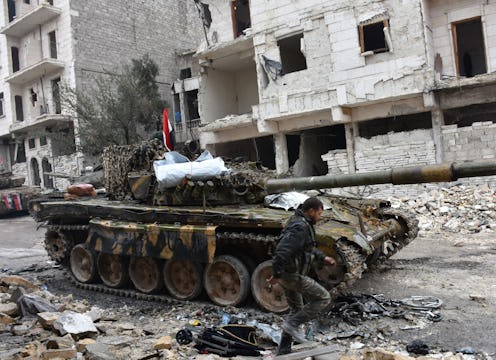News
Aleppo Highlights Weakness Of International Law
If there seems to be any consensus in the media over the atrocities in Aleppo, it's that there is no clear answer to the ongoing humanitarian crisis there. Should the United States intervene? How much or how little? Do we put U.S. planes in the air and risk a conflagration with Russia and possibly World War III? Or do we sit idly by while thousands of civilians are slaughtered?
Instead of a resolute answer one way or the other, we’ve made a choice by not deciding. Most likely, the massacre of Syrian civilians at the hands of President Bashar al-Assad’s government forces will continue (though at the moment, there is an on-again-off-again attempt at evacuating civilians from the besieged area).
The United States has spent much of the fall looking inward as our two political factions duked it out in one of the most bitter presidential elections in recent memory — but as high as the stakes were (are) here in the United States, our introspection has verged on navel-gazing as the situation in Aleppo has deteriorated substantially. In July, Assad began a siege of the rebel-held areas of Aleppo, hoping to starve out the combatants. Such a siege is prohibited by International Humanitarian Law, but Assad is doing it anyway.
International law is complicated. There is no centralized or ultimate authority that supersedes all else, no international equivalent of our Constitution, and the reason for this isn’t hard to divine: Sovereign nations don’t want to give up their sovereignty. So what International Law amounts to is a series of treaties, protocols, and conventions that various sets of nations have agreed to ― though as this map by the International Committee of the Red Cross shows, the endorsement of various parts of International Law remains patchy.
Where the rubber meets the road, however, is that an unenforced law is essentially worthless. In some ways, Assad has been like a child, seeing how much he can get away with before anyone seriously disciplines him. The answer appears to be: pretty far.
It makes me think of a bit by Eddie Izzard about dictators known for killing millions of people. He makes a distinction between Hitler (who “died in a ditch, covered in petrol, on fire”) and Stalin and Polpot (who “got away with it”). “The reason we let them get away with it is because they killed their own people, and we’re sort of fine with that.” This has been demonstrated with hideous regularity in the last century, and with recent examples like Aleppo, Darfur, and Rwanda, we don’t really seem to be nearer stamping it out completely.
I can’t help but think that this lack of urgency on the part of the United States and the West comes back to the extent to which I believe we have othered these parts of the world. I’m not saying that the answer is American boots on the ground, to go in guns blazing, but there is an extent to which the separation we feel as nations is quickly becoming antiquated. We are no longer insulated from what happens on the other side of the planet ― not when we can watch these atrocities in real time.
The crisis in Aleppo is hard to watch, but we must all take the responsibility of witnessing it. We need to force our leaders to think about International Law and how we want to exist within the community of nations. And ultimately, we need to decide whether we can create real, effective International Law, the kind of agreements that would deter thugs like Assad.
